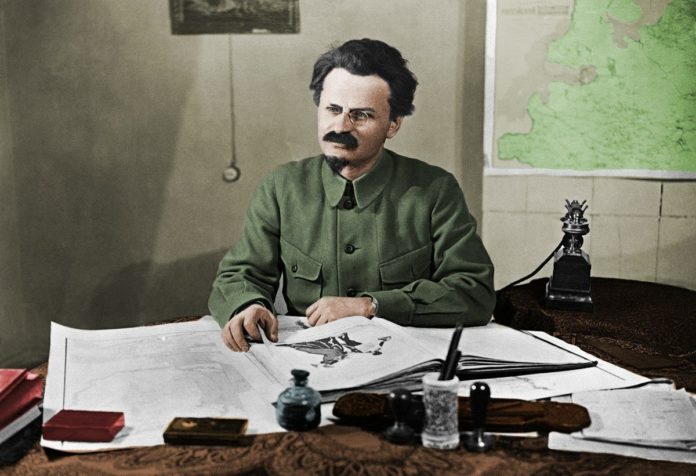
Socialistisk Biblioteks Tidslinje med links til begivenheder og personer i 1879.
Se også Index over personer, organisationer/partier og værker (som bøger, malerier, mm.), steder, begivenheder, mv., der er omtalt på hele Tidslinjen, titler og indhold på emnelisterne osv.
Februar 1879
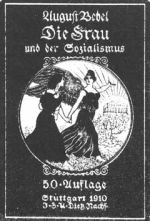
Medio februar udgiver det tyske socialdemokrati bogen Die Frau und der Sozialismus af August Bebel (1840-1913). Udg. sker i Zürich, på grund af forbuddet mod partiet i Tyskland (det såkaldte socialistforbud 1878-1890). 2. udg. udkom illegalt i Stuttgart 1883 med titlen Die Frau in der Vergangenheit, Gegenwart und Zukunft. Dansk udg., Kvinden i Fortid, Nutid og Fremtid, 1884 [i.e. 1885]. Titlen Kvinden og Socialismen på norsk fra 1912.
- Dansk tekst: Kvinden og socialismen (Marxisme Online).
- Engelsk tekst: Woman and Socialism (Marxists Internet Archive).
- Tysk tekst: Die Frau und der Sozialismus (Stimmen der proletarischen Revolution – MLWerke).
Se:
- Klassisk marxistisk kvindeteori (Leksikon.org).
- August Bebel (Leksikon.org).
- August Bebel (Wikipedia.org).
- August Bebel (Marxists Internet Archive). With Biography + Texts online.
Women and socialism: Bebel’s forgotten legacy. By Ben Lewis (Weekly Worker, Issue 959, April 25, 2013). Review of Anne Lopes and Gary Roth, Men’s feminism: August Bebel and the German socialist movement (Amherst, 2000). See also review by Somara Marik (Against the Current, No.109, March/April 2004).
Se også på Socialistisk Bibliotek:
- Tidslinjen 13. august 1913 om August Bebel.
14. marts 1879
Albert Einstein tysk fysiker, matematiker og socialist fødes i Ulm, Württemberg, (dør 18. april 1955 i Princeton, New Jersey, USA).
Se:
- Albert Einstein (Denstoredanske)
- Albert Einstein (Wikipedia.dk) + Albert Einstein (Wikipedia.org)
- Einstein Archive (Marxists Internet Archive)
Hvorfor socialisme? Af Albert Einstein (Revolution, 21. december 2009). In English: Why Socialism? (Monthly Review, May 1949).
Jeg og vi. Af Albert Einstein (Arbejderen, 17. februar 2016). “Einstein efterkom i 1929 en opfordring fra bladet ‘Vi gymnasiaster’ om at give udtryk for sit syn på menneskets fremtid. Udtalelsen indgik i augustnummeret samme år. Udklippet af tidsskriftet Dialog, maj 1955.”
Einstein’s “Why Socialism?” and ‘Monthly Review’: A historical introduction. By John Bellamy Foster (Monthly Review, Vol.76, No.1, May 2024). “Through historical documents and the famed physicist’s own words, Foster rediscovers Einstein’s commitment to socialism in both word and deed, and his collegial ties to MR‘s founding editors.”
Einstein and the revolution of science. By Mark Walsh (Irish Marxist Review, Vol.9, No.26, 2020, p.48-55). “What make Einstein’s work revolutionary was the fact that he was willing to put aside the most obvious, natural assumptions about the world and imagine something different.”
It’s all relative. By Duncan Blackie (Socialist Worker Review, Issue 115, December 1988, p.26-27; online at Marxisme.dk). “Einstein helped lay the basis for massive strides in humans’ ability to both help and destroy one another. The choice of priority was not his.”
Se på Socialistisk Bibliotek:
- Tidslinjen 30. juni 1905 om Einsteins relativitetsteori.
- Tidslinjen 9. juli 1955 om Russell-Einstein-Manifestet.
- Personlisten Albert Einstein (Socialistisk Bibliotek).
23. april 1879
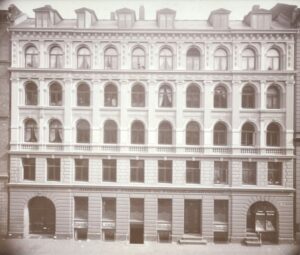
Det første nyopførte Folkets Hus’s festsal indvies i Rømersgade 22 i København. Navnet er “Den almindelige Forsamlings- og Foreningsbygning i Hovedstaden”. Partiets dagblad Social Demokratens ekspeditionskontor og Socialdemokratisk Forbund flytter ind i stuen. På de andre etager bor i perioder partifunktoinærer, bl.a. Th. Stauning (se Tidslinjen 26. oktober 1873, med sin første kone Anna (død 1921). Se om Anna Stauning. Af Erik Nicolaisen Høy (Historieselskabet).
Se:
- Folkets Hus (Leksikon.org).
- Folkets Hus i Rømersgade i København (Plads til os alle). Scroll ned.
- Arbejdernes Forsamlingsbygning (Arbejdermuseet & Arbejderbevægelsens Bibliotek og Arkiv). Historie, tidslinje + video: Arbejdernes første Forsamlingsbygning, 2:41 min, med billeder fra 25-års jubilæet 1904, med engelske undertekster.
Skal vi frede arbejderbevægelse? (pdf). Af Peter Ludvigsen (Arbejderhistorie, nr.2, 2016, s.59-71). “Selv om der er meget store variationer i den rolle, som de mange hundrede Folkets Hus spillede over hele verden, er den kulturskabende funktion ensartet alle vegne gennem mere end 100 år.”
Folkets huse – fællesskabets verdensarv. Af Søren Bak-Jensen og Mogens Jensen (Berlingske, Kronik, 9. april 2018; online på Arbejdermuseet.dk): “Det er på tide at anerkende arbejdernes organisering som industrisamfundets vigtigste folkelige fællesskab.”
5 hjerter til festsalen i dagens Politiken (Arbejdermuseet, Facebook, 28. december 2021). En grundig restaurering af Arbejdermuseets festsal mv. i anledning af 150 året for arbejderbevægelsens start i 1871 anmeldes af Karsten R.S. Ifversen: “Fællesskabets festsal funkler” (Politiken, 28. december 2021, Kultur, s.12; under betalingsmur). “… helheden opleves som god og fortryllende. Dette palads til fælleskabet har ikke fremstået så funklende de senest 40 år …”
Podcast: Arbejdermuseet (Solidaritet.dk/Radioaktiv, 22. august 2019, 40:28 min.) (KulturKanonen, 1). Interview med Søren Bak-Jensen, direktør for Arbejdermuseet.
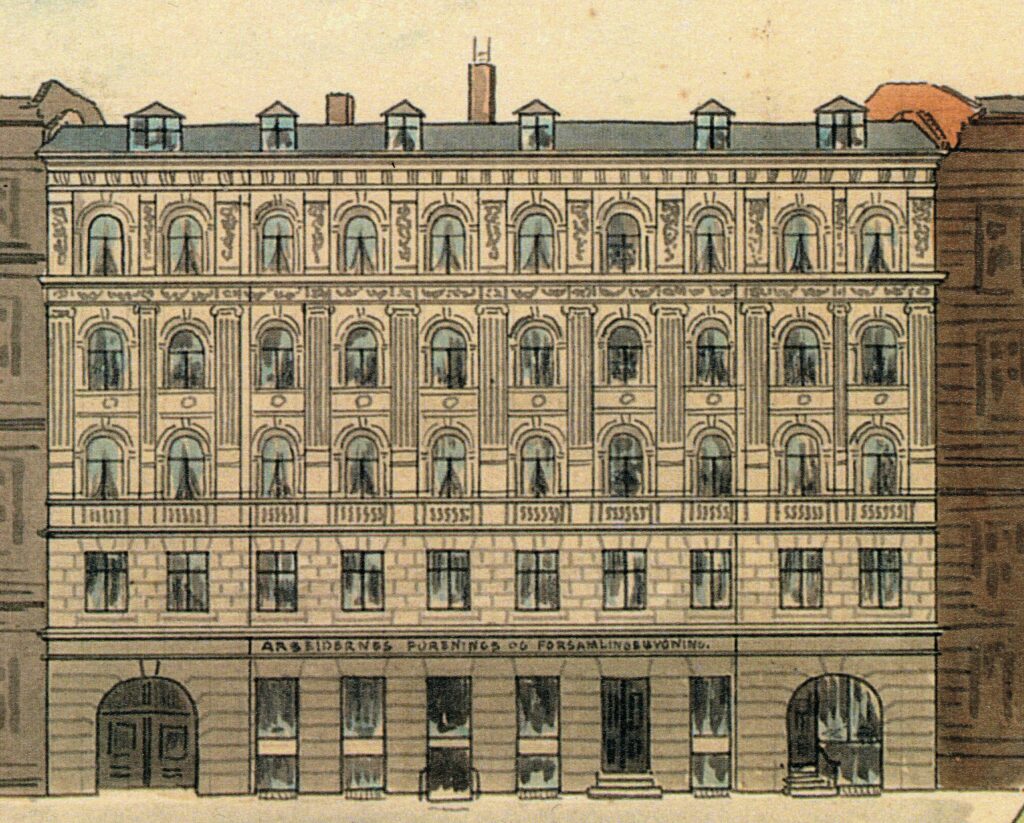
Litteratur:
Velkommen i Forsamlingsbygningen: fortællingen om arbejdernes Forenings- og forsamlingsbygning i Rømersgade 1879-1983. Red. Henning Grelle & Anne-Lise Walsted (Arbejdermuseet & ABA, 2005, 152 sider).
Anmeldelse:
Arbejdernes kulturhus (pdf). Af Nan Dahlkild (Arbejderhistorie, nr.1, 2006, side 103-106). Scroll ned.
Se også:
Arbejdermuseum i København (pdf). Af Hannelene Toft Jensen (Årbog for arbejderbevægelsens historie, nr.11, 1981, side 203-212).
9. juli 1879
Østriske socialist Friedrich Adler fødes i Wien (dør 2.1.1960 i Zürich), myrder den østriske premierminister og stifter senere “2½ Internationalen”.
Se:
- Friedrich Adler (Leksikon.org)
- Friedrich Adler (politician) (Wikipedia.org)
- Friedrich Adler (Politiker) (Wikipedia.de)
Friedrich Adler assassinated the Austrian premier as a protest against world war 1: His speech in court, on trial for his life (1917) (Workers’ Liberty, 20 December, 2013). With introduction by Leon Trotsky.
The witchcraft trial in Moscow (1936). By Friedrich Adler (Marxists Internet Archive)
Political Profiles: Victor and Friedrich Adler (1922). By Leon Trotsky (Marxists Internet Archive)
Se også:
Between Reform and Revolution. By William Smaldone (Jacobin, 23 March 2018). “Amid the radical upheavals of the early 1900s, the Austro-Marxists tried to marry revolutionary aims with reform-minded practice.”
Socialistisk Arbejderinternationale (Leksikon.org).
27. juni 1879
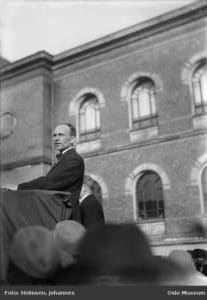
Den norske arbejderpolitiker Martin Tranmæl fødes i Sør-Trøndelag (dør 1. juli 1967).
Se:
- Martin Tranmæl. Af Jorunn Bjørgum (Norsk Biografisk Leksikon)
- Martin Tranmæl. Af Sveir Damslora (Store Norske Leksikon)
- Martin Tranmæl (Wikipedia.nn). Nynorsk artikel.
- Martin Tranmæl (Wikipedia.no). Bokmål artikel.
Se også:
To Moscow and back. By Mímir Kristjánsson (Jacobin, March 2, 2019). “Founded 100 years ago today, the Communist International quickly won the backing of Norway’s mighty Labor Party. The alliance promised to link the Soviets to mass politics in the West — but Moscow soon wasted its opportunity.”
August 1879
Narodnikernes organisation Jord og Frihed (Zemlja i Volja) splittes i to: populisterne og terroristernes Folkets Vilje (Narodnaja Volja)
Se:
- Narodnik (Leksikon.org).
- Narodnaja Volja (Denstoredanske.dk)
- Narodnaya Volya (Wikipedia.org)
Litteratur:
Lenin: Hvad er Folkevennerne (1894). På engelsk: What the ‘Friends Of The People’ are and How They Fight the Social-Democrats (online på Marxists Internet Archive; p.t. ikke online på dansk.)
8. august 1879
Emiliano Zapata fødes i Anenecuilco, Mexico. (Myrdet i baghold 10. april 1919 i Morelos).
Se på Socialistisk Bibliotek:
Linkboxen: Zapata og den mexicanske revolution
24. august 1879
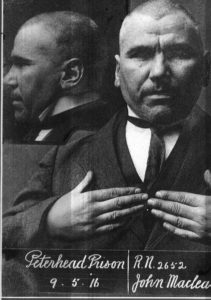
Skotske socialist John MacLean fødes i Pollockshaws ved Glasgow (dør 30. november 1923).
Se:
- John Maclean (Wikipedia.org)
- The John Maclean Internet Archive (Marxists Internet Archive)
100 years on: The revolutionary legacy of John Maclean. By Shaun Morris (Socialist Appeal,
Remembering a fighter. By Joe Stapleton (Against the Current, Issue 203, November-December 2019). Review of Henry Bell, John Maclean: Hero of Red Clydeside (Pluto Press, 2018, 256 p.). “Henry Bell’s well-written biography is a serious achievement in Left historiography.”
“I am not here as the accused, I am here as the accuser of capitalism” (Jacobin, May 9, 2018). “100 years ago today Scottish socialist John Maclean, accused of sedition for his revolutionary organising, delivered an iconic defence of socialism from the dock.” See also the speech at People and Nature blog with introduction and afterword by Terry Brotherstone.
John MacLean, a working class hero: The story of Scotland’s greatest revolutionary figure, Part One. By Kenny McGuigan (In Defence of Marxism, 7 August 2006) + Part Two (16 August 2006) + Part Three (25 August 2006). “Some will seek to dismiss the ideas and programme for which John MacLean gave his life as being outdated. It is hoped that this modest contribution will revive those ideas and contribute towards the real memory of John MacLean – the greatest revolutionary Scotland has ever produced.”
John Maclean and the CPGB. By Robert Pitt (What Next?, July 1995, 44 p.). “This pamphlet makes no claim to present an overall evaluation of John Maclean’s political career. It has a narrow focus: on Maclean’s response to the process which led to the formation of the Communist Party of Great Britain, and his relations with the CPGB in the remaining few years before his death.” See review by Paul B. Smith (New Interventions, Vol.7 No.1, 1996).
Se også:
Socialists took down the British Empire. By Henry Bell (Jacobin, March 2, 2019). “When the Comintern was founded in 1919, the British Empire was the most powerful state in the world. Scottish communist John MacLean promised to destroy it from within.”
The Reds and Green (Jacobin, March 2, 2019). An interview with Emmet O’Connor: “The Irish fight for freedom inspired revolutionaries around the world. Yet the Comintern founded in 1919 struggled to build a lasting socialist presence in independent Ireland’s politics.”
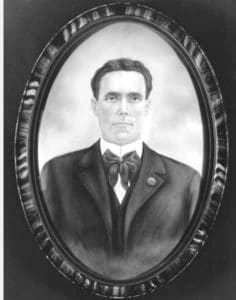
7. oktober 1879
Joel Emmanuel Haggland fødes i Gävle i Sverige. Emigreret til USA under navnet Joseph Hillstrom. Bliver kendt som agitatordigteren Joe Hill (aktivist i den syndikalistiske fagforening IWW: Industrial Workers of the World).
Henrettes 19. november 1915 i Salt Lake City, Utah, hængt op på mord.
Se:
- Joe Hill (Wikipedia.dk)
- Joe Hill (activist) (Wikipedia.org)
- Hill, Joe (Foreningen Sorte Fane). Oversigt over tekster på dansk om Joe Hill.
- Joe Hill (Spartacus Educational)
- Joe Hill Centenary (site). IWW Organizer & Songwriter – Songs of Joe Hill – Works on Joe Hill.
Joe Hill blev myrdet, men udødeliggjort. Af Bjarne Nielsen (Arbejderen.dk, 19. oktober 2015). “I dag er han en legende, hvis navn er udødeliggjort. Sangene af og om Joe Hill synges stadigvæk overalt i verden ved arbejdskampe, demonstrationer og solidaritetsfester.”
Myrdet for at samle arbejderne. Af Ken Bruun (Arbejderen.dk, 19. november 2005). “Den svenske udvandrer Joe Hill kæmpede for at organisere USA`s arbejdere. Det kostede ham livet. I dag er det 90 år siden, at han blev justitsmyrdet.”
Joe Hill was killed for singing Labor’s song. By Carl Winslow (Jacobin, November 19, 2022). “One hundred seven years ago today, the labor troubadour Joe Hill was executed by a Utah firing squad for a crime he almost certainly didn’t commit. His real crime: singing and agitating on behalf of the working class.”
Don’t mourn … organize! Remembering Joe Hill and his music. By Kimberly Ann (Left Voice, November 19, 2021). “Today marks the day 106 years ago that Joe Hill was executed by the state of Utah. An immigrant, worker, Wobbly, and songwriter, we celebrate his legacy with some of his best songs. His work lives on today, still performed widely with the same witty, fierce lyrics that rail against the capitalist system.”
The Letters of Joe Hill. By Adam Tomes (Counterfire, May 19, 2016). Review of Philip S. Foner’s (ed.) book (Haymarket Books, 2015, 121 p.). “The collected writing of a folk balladeer, Wobbly and activist inspires workers and scares the right in equal measure today.”
Joe Hill. By Kevin McCaighy (Socialist Review, Issue 412, April 2016; online at Internet Archive). Review of Franklin Rosemont, Joe Hill: The IWW & the Making of a Revolutionary Workingclass Counterculture (PM Press, 2015, 656 p.). “It is to the great credit of the author … that he mounted this definitive account of the life and achievements of Hill.”
A working-class troubadour (SocialistWorker.org, November 19, 2015). “Avery Wear pays tribute to Wobbly Joe Hill on the 100th anniversary of his execution.”
“Alive As You And Me”: The Songs of Joe Hill. By David Cochran (New Politics, November 17, 2015). “Joe Hill stood foremost among Wobbly songwriters, composing songs to be sung on soapboxes, picket lines or in jail.”
Joe Hill ain’t never died (Socialist Review, Issue 407, November 2015). “Dave Gibson reminds us of the power of Hill’s organising and songwriting skills at a time of upheaval in US politics.”
Labor activist-singer Joe Hill brought humor, hope to the fight. By Chuck Leddy (The Boston Globe, September 5, 2011). Review of William M. Adler, The Man Who Never Died: The Life, Times, and Legacy of Joe Hill, American Labor Icon (Bloomsbury, 2011, 448 p.). “As this splendid, sympathetic biography makes clear, Joe Hill spent his life on the run from the dark realities of capitalism, but Hill’s true genius was his refusal to surrender to despair.”
‘Takes more than guns to kill a man’: The ballad of Joe Hill (Frontline, Vol.2, No.13, November 2010; online at Internet Archive). “Bill Scott looks at one of the greatest union anthems ever written.”
The brief, revolutionary life of Joe Hill. By John Pietaro (Political Affairs, November 3, 2009; online at Internet Archive). “Joe Hill, was – and remains – the guiding force of the Industrial Workers of the World (IWW) and stands as a vision of revolutionary arts for all of the labor movement.”
1915: The murder of Joe Hill (Libcom.org, September 11, 2006). “The story of the death of the American trade unionist, revolutionary and popular song-writer Joe Hill, framed for murder and executed.”
Joe Hill & counterculture. By Michael Lowy (Against the Current, No.115, March/April 2005). Review of Franklin Rosemont, Joe Hill: The I.W.W. and the Making of a Revolutionary Working-class Counterculture (Charles H. Kerr, 2003, 639 p.).”This is not only a wonderful biography of Joe Hill (1879-1915), folk hero and symbol of the revolutionary labour movement, but also an outstanding study of the insurgent culture of the Industrial Workers of the World (IWW). See also review by Peter Linebaugh: Joe Hill and the IWW (CounterPunch, October 3-5, 2003).
Joe Hill: songwriter to the working class. By John Bissett (Socialist Standard, No.1154, October 2000). “[He had] a unique ability to condense the arguments against injustice into songs which changed the words of well-known Christian tunes.”
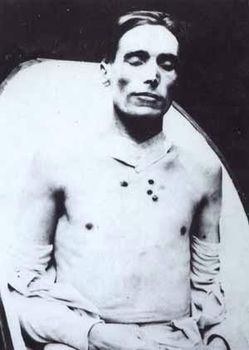
Film / Video:
Jim Larkin’s oration at Joe Hill’s funeral 1915 (YouTube.com, 8:50 min.)
Joe Hill – Documentary with English subtitles (YouTube.com, 28:02 min.). A film by Anders Wesslén and Karl Larsson. Music by Joakim Westlund, Anders Åborg, The Giant’s Dream and Per Erik Wesslén. Subtitles download:
Joe Hill. Instr. Bo Widerberg, 1971 (Youtube.com, 157 min.). Engelsk tale, uden undertekster.
See Joe Hill (film) (Wikipedia.org).
Se også:
The music of Labor: from movement to culture. By Michael L. Richmond (Union Songs)
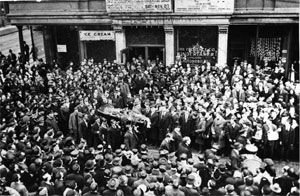
Se også på Socialistisk Bibliotek:
- Linkboxen Joe Hill, 1879-1915. Med mange sange online.
- Tidslinjen 27. juni 1905 om IWW: Industrial Workers of the World.
“Spild ikke tiden med at sørge. Organisér”
(fra afskedsbrev til Bill Haywood, IWW).
8. oktober 1879
En af stifterne af Kinas Kommunistiske Parti (KKP), Chen Duxiu, generalsekretær 1921-27, fødes i Anqing. (Dør i Chongqing den 27. maj 1942, se denne)
7. november 1879
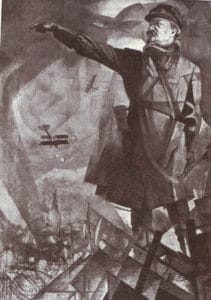
Lev Trotskij (Lev Davidovich Bronstein) fødes i Janovka (sydlige Ukraine), (26. oktober efter gamle russiske kalender). Myrdes 21. august 1940 i Mexico City af stalinistisk agent.
Leksikalt:
- Trotskij, Leo (Lev Bronstein) (Leksikon.org)
- Lev Trotskij (Denstoredanske.dk)
Værker/Works:
- Leon Trotskij (Marxisme Online)
- Leon Trotskij (1879-1940) (Marxistisk Internet Arkiv: Dansk afdeling)
- Trotsky Internet Archive (Marxists Internet Archive). With Texts, Photographs, Biography and Selected quotes.
Incl. ETOL – Encyclopidia of Trotskyism Online. With Revolutionary History
Magazine (mirror), Toward a History of The Fourth International + on international tendensis, Newspapers and Periodicals, Writers Archive, Global Master Index of All Entries… etc.
Full 14 volumes of writings of Leon Trotsky 1929-1940 (Ebookcollective, June 27, 2014). Online as pdf-files. See also Leon Trotsky – Collected Writings (1929-1940), 14 volumes (Archive.org)
My life. By Leon Trotsky (New York, Charles Schribner’s Sons, 1930, 459 p.) (Marxists Internet Archive). På norsk: Forord til den norske utgaven av Mitt liv. Av Leo Trotski (Tiden Norsk Forlag, 1935; online på Marxists Internet Archive, Norsk seksjon).
Les Cahiers Léon Trotsky. Furent publiés de 1979-2003 par l’Institut Léon Trotsky, fondé en 1977 par Pierre Broué. Online: Numéro 1 (janvier 1979) – Numéro 80 (mars 2003) (l’Archive Internet des Marxistes, Section française)
Leon Trotsky – a virtual exhibition (Glasgow University Library – Special Collections Department). With Introduction – Overview of the Trotsky Collection – Chronology of Trotsky’s Life – Exhibition of Trotsky material (books, periodicals etc.).
Biografier mv./Biographies etc.:
Trotsky Bibliography. List of separately published titles, periodical articles and titles in collections treating L.D. Trotsky and Trotskism/Bibligraphie selbständiger un unselbständiger Schriften über L.D. Trockij und den Trotzismus. Ed. by Wolfgang Lubitz (K.G. Saur, 1982. 458 pages). 2.+3. eds., 1988 +1999. See: About the Lubitz’ Leon Trotsky Bibliographies (1982-1999) + The online version … “follow-up to the 3 printed editions” of … Lubitz’ Leon Trotsky Bibliography (LLTB): International Systematic Guide to Works about Trotsky and Trotskyism. Compiled and edited by Wolfgang and Petra Lubitz (Sixteenth online edition, January 2018).
Trotskyist Serials Bibliography 1927-1991. With Locations and Indices. Ed. by Wolfgang and Petra Lubitz. Preface by Palo Casciola (Sauer, 1993, XXVI + 475 pages). Survey + Online complete (pdf).
Leon Trotsky (Lubitz Trotskyana Net). Some basic biographical and bibliographical information.
Lev Trotskij. Af Paul Le Blanc (Solidaritet, 2016, 286 s.).
Anmeldelse:
Trotskismens to sjæle. Af Bjarke Friborg (Solidaritet, nr. 10, december 2016, side, 30-31).
Af en krigsførende martyrs liv. Af Silas L. Marker (Socialistisk Information, 26. november 2016).
Engelske originaludgave:
Leon Trotsky. By Paul Le Blanc (Reaktion, 2015, 224 p.). See the book’s introduction (p.7-30): Introducing a life (International Socialist Review, Issue 95, Winter 2014-15).
Reviews/Debate:
Review by Sean Ledwith (Marx & Philosophy Review of Books, 8 July 2016).
New books shed light on Trotsky’s struggle against Soviet bureaucracy. By Barry Healy (Links: International Journal of Socialist Renewal, January 25, 2016).
Half socialist? Leon Trotsky and the Soviet Union. By John Rose (International Socialism, Issue 149, Winter 2016, page 175-184). See Letter by Paul Le Blanc (Issue 150, Spring 2016, page 183-184).
Assessing John Marot, by Louis Proyect (The Unrepentant Marxist, November 8, 2015)
Assessing Trotsky, by John Marot (Jacobin: Reason in Revolt, November 7, 2015). Longer review article.
A response on Trotsky, by Paul Le Blanc (Against the Current, Issue 179, November-December 2015). Reply to Alan Wald.
Leon Trotsky: revolutionary fighter, by Jeff Mackler (Socialist Action, October 15, 2015).
The indispensable Trotsky, by Todd Chretien (SocialistWorker.org, September 22, 2015).
Between the power and the dream, by Alan Wald (Against the Current, Issue 178, September-October 2015).
The prophet reassessed, by Ian Birchall (Review, Issue 31, March 2015).
Leon Trotsky, by Lewis Nielsen (Socialist Review, Issue 404, July-August 2015).
“A most intelligent and insightful presentation of Trotsky’s thought and historical action”, by Michael Löwy (International Viewpoint, 3 May 2015).
Trotsky. By David Renton (Haus, 2004, 181 p.) (Life and Times)
Review:
Following the revolution to its end. By Alex Miller (Green Left Weekly, Issue 709, May 10, 2007). “Anyone looking for a quick and inexpensive introduction to Trotsky’s contribution to the socialist journey could do far worse than start with Renton’s engaging and well-produced biography.”
Theme: Trotsky: The Spartacus of the 20th century (Workers Liberty, Vol.3, No.14, August 2007; and as pdf-file). With articles by Max Shachtman, Natalia Sedova Trotsky, Larissa Reissner, Jean van Heijenoort and Anatoly V. Lunacharsky.
Trotskij: en biografi. Av Pierre Broué (Carlsson Bokförlag, maj 2011, 991 sider). Se Recensioner, debatt, kompletterande material (Marxistarkiv.se) + Understanding Trotsky, by Ernest Mandel (Socialist Outlook, No.17, Summer 1989). Review of Pierre Broué, Trotsky (Paris, Fayard, 1988). In Swedish: Om Pierre Broués ‘Trotskij. En biografi’ (pdf) (Marxistarkiv.se).
Tony Cliff’s Trotsky-biography (London, Bookmarks, 1989-1993):
Trotsky, Vol. 1: Towards October: 1879-1917 (314 p.).
Trotsky, Vol. 2: The sword of the revolution: 1917-1923 (309 p.).
Trotsky, Vol. 3: Fighting the rising Stalinist bureaucracy: 1923-1927 (306 p.).
Trotsky, Vol. 4: The darker the night the brighter the star: 1927-1940 (427 p.).
Trotskij som alternativ (pdf) (1995). Av Ernest Mandel (Marxistarkiv.se, 2006, 148 s.).
Trotsky’s Marxism. By Duncan Hallas (London, Pluto Press, 1979, 122 p.; online at Marxists Internet Archive). See also Duncan Hallas: Leon Trotsky: Life of a revolutionary (1970) (International Socialist Review, Issue 74, November–December 2010).
Isaac Deutschers Trotsky-biografi (Stockholm, René Coeckelberghs bokförlag, 1973). (Marxistarkiv.se):
Den väpnade profeten: Trotskij 1879-1921 (1954) (pdf)
Den avväpnade profeten: Trotskij 1921-1929 (1959) (pdf)
Den förvisade profeten: Trotskij 1929-1940 (1963) (pdf)
Se også på Socialistisk Bibliotek om Isaac Deutscher linksamlingen: Isaac Deutscher – Reviews / Debate etc.
Krassó-Mandel: Debatt om Trotskijs marxism 1967-69 (Trotskijs marxism: en debattskrift, Zenitserien 12, 1971, 136 s.; online på Marxists Internet Archive, Svenska arkivet). “Debatten om Trotskijs marxism mellan Nicolas Krassó och Ernest Mandel fördes ursprungligen i den brittiska vänstertidskriften New Left Review under åren 1967-69.”
Tema: Reminiscences, tributes and evaluations (Fourth International, No.7, Autumn 1959, p.21–29). With articles by Karl Radek, Rosa Luxemburg, Larissa Reissner, Victor Serge, Jacques Sadoul, Isaac Deutscher and Jan van Heijenoort.
Trotsky’s place in history. By J.R. Johnson [i.e. C.L.R. James] (The New International, Vol.VI, No.8, Whole No.45, September 1940, p.151–167)
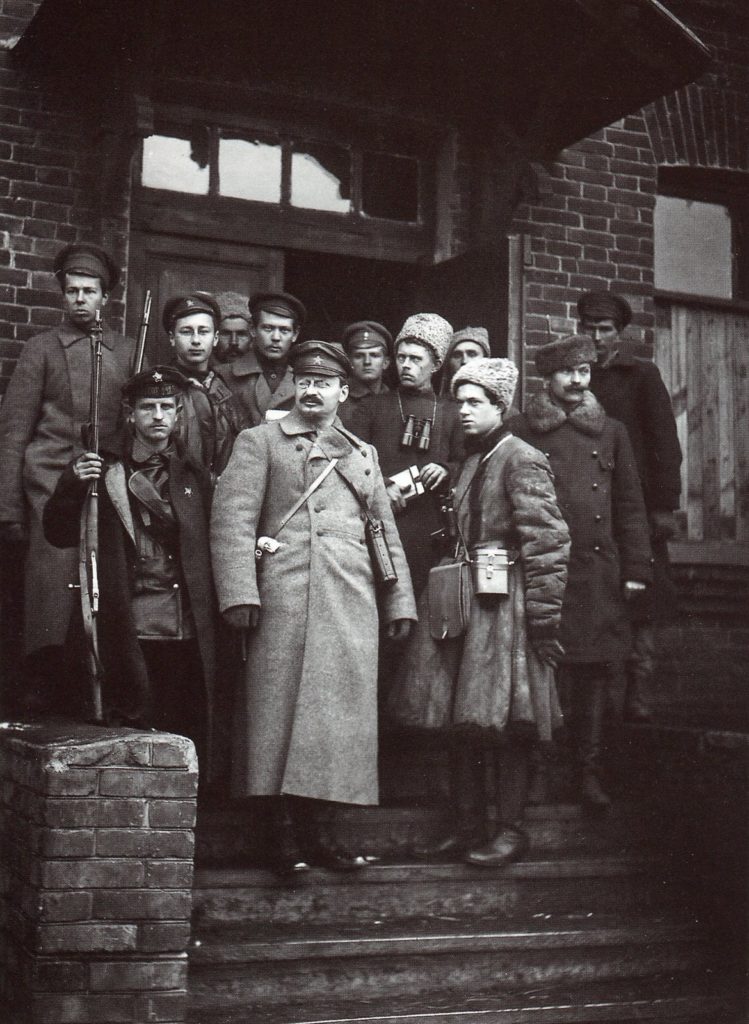
Reviews of other books about Trotsky:
On the 80th anniversary of Trotsky’s assassination—what if he had lived? By Dan La Botz (New Politics, Blog, August 20, 2020). “In my counter-historical novel Trotsky in Tijuana [BookLocker.com, 2020, 471 p.], being published on the anniversary of his assassination eighty years ago, I attempt to understand Trotsky the man and the political leader by projecting his life into a future he did not live to see.” See anmeldelser/reviews af Dave Kellaway: Profeten levede videre (Socialistisk Information, 15. januar 2021) + Bill Keach: Counter-historical Revolutionary (New Politics, November 19, 2020) + Paul Le Blanc: Fictionally comprehending Trotsky (Against the Current, Issue 212, May-June 2021).
Trotsky in New York, 1917: A Radical on the Eve of Revolution. By Linda Tenenbaum (World Socialist Web Site, 8 October 2016). Review of Kenneth D. Ackerman’s book (Counterpoint, 2016, 384 p.). “He has unearthed a wealth of previously little known material and produced from it a book that is appealing and thought-provoking.” See also Paul Hamton: On the eve of revolution (Solidarity, Issue 431, 1 March 2017) + Alex Steinberg: A Russian revolutionary in the Bronx (International Socialist Review, Issue 104, Spring 2017) + Kenneth D. Ackerman & Arvind Dilawar: Trotsky’s New York (Jacobin: Reason in Revolt, 26 October 2016)
Bureaucracy and revolution. By Ian Birchall (International Socialist Review, Issue 100, Spring 2016, p.181-184). Review of Thomas Twiss, Trotsky and the Problem of the Soviet Bureaucracy (Brill, 2014 / Haymarket Books, 2015, 502 p.). See also review by Tom Gordon: State, power and bureaucracy (International Socialism, Issue 151, Summer 2016, p.200-202) + by Martin Thomas: Trotsky’s criteria for a workers’ state (Solidarity, Issue 414, 31 August 2016) + by Kevin Murphy: Trotsky and the problem of Soviet Bureaucracy (Historical Materialism, Blog, 7 March 2017; online at Internet Archive) + Kevin Murphy: Theorizing the Soviet Bureaucracy (Against the Current, Issue 192, January-February 2018) + Thomas Twiss: The development of Trotsky’s analysis of the Soviet bureaucracy (Links: Journal of Socialist Renewal, August 19, 2016)
Lenin and his biographers. By Paul Le Blanc (International Socialist Review, Issue 86, November-December 2012). Review of nine books. Svensk udgave: Fortfarande vid god vigör: Lenin och hans levnadstecknare (pdf) (Marxistarkiv.se, 10.03.2016, 17 s.)
Trotsky: Writings in Exile (Counterfire, 29 August 2012). “Alex Snowdon recommends a collection of Trotsky’s that gives access to some of the best Marxist writing on a wide range of subjects.”
Leon Trotsky: A Revolutionary’s Life. By Peter Stauber (Counterfire, 18 October 2012). Review of Joshua Rubenstein’s book (Yale University Press, 2011)
Trotsky – truth and fiction. By Paul Le Blanc (International Socialist Review, Issue 75, January–February 2011). Review of nine novels and biographies.
Review of of Robert Service, Trotsky: A Biography (Cambridge, Massachusetts, Harvard University Press, 2009):
The re-assassination of Trotsky, by Scott McLemee (Inside Higher Ed, July 8, 2011)
The American Historical Review discredits Robert Service’s biography of Leon Trotsky, by David North (World Socialist Web Site, 28 June 2011)
Revolutionary betrayed: Trotsky and his biographer, by Tom Twiss and Paul Le Blanc (International Socialist Review, Issue 71, May–June 2010)
Out of Service, by Ian Birchall (London Socialist Historians Group Newsletter, No.38, April 2010; online at Grimanddim.org).
In defence of Leon Trotsky, by Hillel Ticktin (Weekly Worker, Issue 806, February 25, 2010)
Trotsky lives!, by Paul Le Blanc (International Viewpoint, Issue 419, December 2009)
Trotsky: A Biography, by Dave Sherry (Socialist Review, Issue 342, December 2009; online at Internet Archive)
Review of Robert’s Service’s biography of Trotsky, by Paul Hampton (Workers Liberty, 12 November 2009)
In the service of historical falsification, by David North (World Socialist Web Site, 11 November 2009)
Theories of Stalinism. By Paul Le Blanc (Against the Current, No.143, November-December 2009). Review of Kunal Chattopadhyay’s The Marxism of Leon Trotsky (Kolkata, Progress Publishers, 2006). Svensk udgave: Teorier om stalinismen (pdf) (Marxistarkiv.se, 25. februar 2019, 10 s.)
A review of two Trotsky biographies by Geoffrey Swain and Ian Thatcher: Leon Trotsky and the post-Soviet school of historical falsification. Part 1-4. By David North (World Socialist Web Site, 9-12 May 2007). See also review by John Molyneux: Trotsky slandered (International Socialism, Issue 112, Autumn 2006)
The prophet vulgarized. By Daniel Singer (The Nation, February 24, 1999). Review of Dimitri Volkogonov, Trotsky: The Eternal Revolutionary (HarperCollins, 1997, 524 p.). “Does this biography reveal crucial secrets from the Soviet archives that might alter our interpretation of Trotsky’s role? Even this, alas, is stuff for blurb writers. What is important is not new and what is new is relatively unimportant.” See also review by Al Richardson: A Yeltsinite hatchet job on Trotsky (What Next?, No.5, 1997) + Samuel Farber: The uses of Dmitri Volkogonov (Against the Current, Issue 63, July/August 1996).
Video / film etc.:
Netflix’s Trotsky: A toxic combination of historical fabrication and blatant anti-Semitism. By David North and Clara Weiss (World Socialist Web Site, 8 March 2019). “What is being presented by Netflix is not history. It is not even an artistic fictionalization of history, in which certain liberties have been taken for legitimate dramatic purposes. Netflix’s series is a monstrously reactionary exercise in historical falsification.” See more critics:
- Vänsterpress om Netflix-serie om Leo Trotskij (pdf) (Marxistarkiv.se, 1. maj 2019, 11 s.). “Vi har nedan samlat de artiklar om Trotskij-serien som förekommit i svensk vänsterpress.”
- Anmeldelse af TV-serien Trotskij. Af Anders Krogh (Revolution, 11. april 2019). “Der [er] tale om en serie, som forholder sig så kreativt til historiske begivenheder, at serien på ingen måde bidrager til at forstå begivenhederne – tværtimod.”
- Skandalös rysk Trotskij-serie på Netflix (pdf) (Marxistsarkiv.se, 15. marts 2019, 20 s.). “Vi har nedan samlat exempel på detta från internationell press, både vänsterpress och mainstreammedia …”
- Lies, damned lies and Netflix: the character assassination of Leon Trotsky (In Defence of Marxism, 14 March 2019). “Trotsky, a recent Netflix series produced by Russian state television, is a scandalous misrepresentation of both Trotsky’s life and the October Revolution. Alan Woods and Josh Holroyd respond to this insulting portrayal of Trotsky and the Bolsheviks’ legacy.”. På svensk: Lögner, förbannade lögner och Netflix (pdf) (Marxistarkiv.se, 16. september 2019).
- Netflix’s Trotsky is terrible history. By Benjamin Stephens (Jacobin, March 10, 2019). “Netflix’s Trotsky is a sinister rewriting of history, intended to benefit the right-wingers who dominate modern Russian politics.”
- Nancy Fraser, Fredric Jameson and more join Trotsky’s grandson in repudiating Netflix’s “Trotsky” (LeftVoice, February 20, 2019). “Netflix and the Russian Government join forces to spread lies about Trotsky” + some of the main historical falsifications.
- The prophet perverted. By Harrison Fluss and Landon Frim: (Jacobin, 17 February 2019). “Netflix’s Trotsky miniseries demonizes its namesake with antisemitic themes and rank nationalism.”
- Russian television’s Trotsky serial: A degraded spectacle of historical falsification and anti-Semitism. By Fred Williams and David North (World Socialist Web Site, 19 December 2018). “The series is an exhibition of the political, intellectual and cultural depravity of all those involved in the sponsorship and production of this grotesque falsification of history.”
- Trotsky (TV series) (Wikipedia.org)
- Leon Trotsky: the life of a revolutionary (International Marxist Tendency, 25 October 2017, 45:54 min.). “Alan Woods narrates Trotsky’s extraordinary career … Featuring footage from the Trotsky museum in Coyoacán Mexico, and first-hand accounts from Trotsky’s grandson, Esteban Volkov …”
- Trotskij i exil: pjäs i två akter (pdf). Skuespil av Peter Weiss (Marxistarkiv.se, 78 s.; svenska upplagan 1970). Med ‘Lästips’ + kommentarer af bl.a. Werner Schmidt, Ernest Mandel + George Breitman ift. stykket og dets historie.
Trotskij og Cafe Central, Wien
Cafe Central (Wikipedia.org)
I hvert vindue står et lille skilt om de kendte gæster og stamkunder på cafeen, også Lev Trotskij (tysk: Leo Trotzki), som boede i Wien 1907-1914, på 7 adresser i byen, og var stamkunde på byens Cafe Central i en kreds af ledende venstre-socialdemokrater, såkaldte austromarxister** (Rudolph Hilferding, Karl Renner, Otto Bauer mfl.), som han bedømmer som vidende … og selvtilfredse typer. (I selvbiografien My Life, 1930, chapter 16; online på på Marxists Internet Archive).
Trotskij-omtalen på Cafe Central med historien om at revolution i Rusland skulle ledes af “den ukendte hr. Bronstein fra Cafe Central”. (foto: Adam Johansen, 2021).
**Se om austromarxismen på Tidslinjen 12. februar 1934.
Se også:
Hvis USA blev kommunistisk (1935). Af Leon Trotskij (Revolution, 17. november 2019)
Litteraturen og revolutionen (1923). Af Lev Trotskij (Passage: tidsskrift for litteratur og politik, nr.64, 2010, s.77-82)
Se også på Socialistisk Bibliotek:
- Tidslinjen september 1906 om Trotskij og den permanente revolution.
- Tidslinjen 12. november 1927 om Trotskij eksklusion og landsforvisning.
- Tidslinjen 12. februar 1929 om deportation til Tyrkiet og opholdet på Prinkipo.
- Tidslinjen 27. november 1932 om Trotskijs besøg i Danmark og “Københavnertalen“.
- Tidslinjen 18. juni 1935 om Trotskijs ophold i Norge.
- Tidslinjen 4. august 1936 om Trotskijs sidste bog: Revolutionen forrådt: Hvad er Sovjetunionen og hvor styrer den hen ?
- Tidslinjen 10. april 1937 om Dewey-høringerne af Trotskij (anti-Moskva-processerne).
- Tidslinjen 3. september 1938 om dannelsen af 4. Internationale.
- Tidslinjen 21. august 1940 om mordet på Trotskij.
- Emnelisten Den Russiske Revolution 100 år
- Emnelisten Den Russiske Revolution, fra februar – oktober 1917
21. december 1879
Josef V. Stalin egen opgivelse af fødedag. (18. dec. 1878 anses nogle steder mere korrekt).
Han dør 5. marts 1953, se denne).
















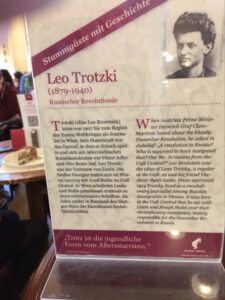
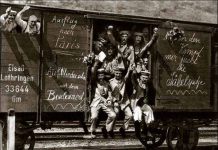
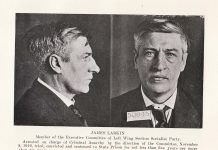
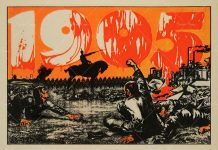













![Illustration to Robert Burns' poem Auld Lang Syne by J.M. Wright and Edward Scriven. The Complete Works of Robert Burns: Containing the Poems, Songs, and Correspondence. Illustrated By W.H. Bartlett, T. Allom, and Other Artists. With a New Life of the Poet, and Notices, Critical and Biographical[1] by Allan Cunningham. Published in London by George Virtue. No year is given explicitly, but "James Gibson 1856" has been handwritten inside the front cover, it's dedicated to a MP, Archibald Hastie of Paisley, who was no longer a MP by 1857, and some of the artists and engravers were dead before 1842. As such, I'm going with c. 1841 as the year, though it could be as late as 1856, when James Gibson evidently acquired. From: The Complete Works of Robert Burns: Containing the Poems, Songs, and Correspondence. Illustrated By W.H. Bartlett, T. Allom, and Other Artists. With a New Life of the Poet, and Notices, Critical and Biographical by Allan Cunningham, London: George Virtue. Drawn by John Masey Wright (1777–1866, artist), Engraved by John Rogers (c. 1808-c. 1888, engraver), Restored by Adam Cuerden (1979–, restorationist), Cropped by Beyond My Ken. Public Domain.](https://socbib.dk/wp-content/uploads/2018/02/John_Masey_Wright_-_John_Rogers_-_Robert_Burns_-_Auld_Lang_Syne_crop-100x70.jpg)